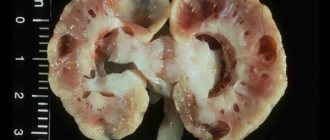Pyelonephritis - what is it?
Pyelonephritis is an infectious inflammatory disease that affects the kidneys. Its main danger is the high probability of intoxication of the entire body: when filtered, toxins penetrate into the blood, which subsequently spread throughout the entire circulatory system and can cause serious complications.
In more than 85% of cases, pyelonephritis is diagnosed in dogs over 8 years of age. All breeds are susceptible to the disease, but those at particular risk include:
- bulldogs,
- shih tzu,
- Dalmatians,
- poodles,
- german shepherds,
- Yorkshire Terriers.
Based on the affected area, unilateral and bilateral pyelonephritis is distinguished. In the first case, the lesion affects only one kidney, in the second - both at once. Bilateral pyelonephritis much more often leads to a subsequent diagnosis of chronic renal failure (CRF), which also requires prompt diagnosis and professional treatment.
Causes of the disease
According to statistics, kidney diseases develop in animals after 8 years of life. In most cases, pyelonephritis in dogs is diagnosed against the background of diseases of the urinary system.
The main causes of the pathology:
- kidney and urinary tract diseases: nephritis, vaginitis, urocystitis, urolithiasis and so on;
- diabetes;
- inflammatory process in the bladder;
- hypothermia of the animal;
- injury, tumor or bruise in the kidney area;
- congenital pathologies of the ureters;
- stone in the renal pelvis;
- obstruction of blood circulation in the kidney tissues;
- in rare cases, pathology is caused by diseases of the uterus in bitches: pyometra or endometritis.
The causative agent of the disease can be various bacteria and microorganisms, but most often the cause of pyelonephritis is E. coli, enterococci, salmonella, staphylococci, as well as certain forms of viruses or fungi.
Common causes of the disease
The most common causative agent of pyelonephritis is Escherichia coli. It affects one or both kidneys at once, leading to the development of inflammatory processes. In other cases, the causative agents of infection are viruses, staphylococcus and salmonella .
The main reasons that can cause pyelonephritis in dogs:
- Damage to the urinary system.
Nephritis, urethritis, vaginitis and other inflammatory diseases of the bladder increase the likelihood of your pet developing pyelonephritis. It is often diagnosed after a history of urolithiasis.
- Diabetes.
This is one of the most common factors provoking the development of the disease. As a result of diabetes, metabolism is disrupted and the pressure in the kidneys changes, which negatively affects the condition of the animal.
- Inflammation of the uterus.
Dangerous products (bacteria, toxins) that arise during inflammation of the uterus penetrate the kidneys through the bloodstream and lymphatic system. The result is the development of pathology in the kidneys. These are hematogenous and lymphogenous causes of pyelonephritis.
- Circulatory disorders.
Severe poisoning, intoxication of the body, long-term use of certain medications (in particular, if the timing and dosage are violated) cause problems with blood circulation and dangerous pathological processes.
- Neoplasms.
Tumors arising in the urinary system, as well as the growth of prostate cells, are some of the reasons that can lead to inflammatory processes affecting the collecting system and renal tubules.
- Other reasons.
Factors that provoke the disease: hypothermia of the body (for example, when bathing an animal in cold water), damage to the spinal cord, unskilled operations on the organs of the excretory system.
Causes of pyelonephritis in dogs
Veterinary experts consider pyelonephritis to be one of the dangerous diseases of the excretory system in animals. The pathology of an inflammatory nature involves the main structures of the kidneys - the pelvis, renal tubules, interstitial tissues and even the parenchyma of the organ.
Damage to the renal tubules and pelvicalyceal system is complicated by a bacterial or viral infection, which negatively affects not only the excretory system, but also the state of health in general.
The reasons contributing to the development of the disease in veterinary practice include:
- Diseases of the urinary system . A pet's history of nephritis, urethritis of various etiologies, vaginitis and inflammation of the bladder increases the risk of developing pyelonephritis. Such a common pathology among dogs as urolithiasis, according to experts, in 15% of cases is the cause of purulent inflammation of the renal structures. In this case, veterinarians talk about an ascending infection.
- Diabetes mellitus can provoke the development of the disease , in which not only metabolic disorders occur throughout the body, but also renal pressure changes, which negatively affects the state of the protective systems of the paired organ.
- Veterinary specialists often discover a congenital anomaly in the development of the excretory system as the cause of pyelonephritis in dogs.
- In females, diseases such as pyometra and endometritis . Inflammatory products from the uterus penetrate through the bloodstream and through the lymphatic system into the kidneys, leading to the development of the pathological process. This route of infection in veterinary practice is called hematogenous and lymphogenous.
- Often, pyelonephritis can be caused by a kidney injury from a fall or blow, or injury to the organ due to a traffic accident.
- Poor circulation in the kidneys due to poisoning or intoxication with drugs is one of the reasons for the development of inflammation in the excretory system.
- Inappropriately performed surgery is a rare but possible cause of pyelonephritis in furry patients.
- Neoplastic formations in the kidneys, bladder, urinary canals, prostate hyperplasia can also lead to the development of inflammation in the renal pelvis.
According to veterinary experts, hypothermia can provoke the development of pyelonephritis in four-legged pets. Bathing a dog in cold water or open water often leads to the development of serious kidney disease. Weakened immunity and advanced age increase the risk of developing pyelonephritis in animals.
We recommend reading about the symptoms of nephritis in dogs. From the article you will learn about the causes and signs of the disease in dogs, the classification of nephritis, diagnosis and treatment of acute and chronic forms of the pathology.
And here is more information about the signs and treatment of kidney failure in dogs.
Symptoms of pyelonephritis in dogs
According to the type of disease, chronic and acute pyelonephritis are distinguished. In the first case, the infectious process in the first stages passes practically without symptoms. It develops gradually over several months. It is possible to diagnose chronic pyelonephritis in the initial stages only when visiting a veterinary clinic.
In acute pyelonephritis, the kidney tissue swells, causing them to significantly increase in size.
The acute form is accompanied by the following symptoms:
- Lethargy and apathy.
The dog moves little: tries to avoid sudden movements and excessive activity. Practically does not participate in games, reacts painfully to stroking in the lumbar region.
- Decreased appetite.
In acute and chronic pyelonephritis in the final stages, the pet refuses to eat. She rapidly loses weight, and in especially severe cases, anorexia is observed.
- Thirst.
The dog drinks a lot often. As a result, urination becomes more frequent. In the last stages of the disease, there is often a false urge to urinate. There may be blood in the urine.
- Hyperthermia.
Body temperature in some cases rises to 41 °C, while the animal experiences chills and muscle tremors.
- Other symptoms.
Vomiting, dehydration, the specific smell of acetone from the mouth are signs that appear in the last stages of the disease and in especially severe cases.
Have you noticed one or more signs in your pet that indicate the development of pyelonephritis? Do not hesitate - seek help from experienced veterinarians. By trying to help your dog at home, you are risking his health.
Symptoms of the disease in a dog
Pyelonephritis is diagnosed through a comprehensive examination. Only a doctor makes a diagnosis and only in a hospital setting. Diagnostic methods:
- blood biochemistry;
- biochemistry of urine;
- general blood analysis;
- general urine analysis;
- ultrasound examination of the kidneys;
- Ultrasound of the bladder;
- X-ray with contrast agent.
Diagnosis will require a urine test.
Establishing diagnosis
Under no circumstances should you try to make a diagnosis yourself. A mistake will cost the pet too much.
During illness, the dog becomes lethargic and depressed.
- There are no specific symptoms for this pathology . It all depends on the origin of the disease. As a rule, a sick dog experiences lethargy, depression, does not respond to the owner’s call, and tries to hide. Appetite is noticeably reduced, and in advanced cases is completely absent.
- Thirst sets in, the dog drinks a lot and often, which inevitably leads to frequent and voluminous urination . There may be blood or sediment in the urine. Less commonly, there may be a false urge to urinate. Due to pain in the lumbar back, the dog walks on half-bent legs and carefully steps over.
- The temperature rises, sometimes muscle tremors and febrile states are recorded . Swelling may occur. In complicated cases, intoxication of the body begins, which is accompanied by nausea and vomiting. The animal rapidly loses weight, apathy intensifies, dehydration develops, severe weakness in the limbs, and the smell of acetone from the mouth.
Diagnosis of the disease
Only a specialist can diagnose pyelonephritis. He makes a diagnosis based on the clinical picture obtained during the initial examination. Additionally, urine and blood tests are prescribed. If necessary, an ultrasound of the genitourinary system is performed.
With pyelonephritis, the urine becomes cloudy and has an alkaline reaction (pH more than 7). When examined, it reveals:
- bacteria,
- high protein content,
- leukocyte sediment,
- red blood cells.
When examining blood, a decrease in red cells (anemia), a high erythrocyte sedimentation rate, and an increase in band neutrophils are observed. Using ultrasound, the veterinarian identifies structural changes in the kidneys (for example, an increase in size).
How to prevent disease
It is practically impossible to prevent the onset of the disease, but identifying it in the early stages is quite possible. To do this, you need to visit the veterinarian every few months and carefully monitor your beloved friend’s immune system. Dogs that have managed to overcome the disease should be under special supervision. Once a year it is necessary to do an ultrasound scan of the abdominal cavity, a urine test and a complete blood count.
When we buy a puppy or pick one up on the street, we are ready to give all our love and care to this little bundle. He is our friend for several years, maybe for several decades. But we are his whole life, filled with devotion, love and boundless faith in us.
It is in our power to protect him and not leave him to the mercy of fate in difficult times. Pyelonephritis is one of the most serious diseases of dogs. Having been ill once, your pet may remain disabled for the rest of its life. We can save almost every animal if we pay attention to our pet in time and are not indifferent to its suffering. Remember that we are responsible for those we have tamed.
Currently reading:
- Symptoms of viral hepatitis in dogs and its treatment
- Seven Signs and Remedies for Getting Rid of Fleas in Dogs
- Is it worth it or not to include natural food in your dog’s diet?
- The American Cocker Spaniel is an adroit hunter and loyal friend.
Treatment of pyelonephritis
The main task of a veterinarian treating pyelonephritis is to eliminate the cause that provoked the inflammation. Antibiotics of various groups are most often prescribed. If necessary, drugs are selected that are suitable for the animal's sensitivity (for example, when using urine culture).
If pyelonephritis occurs as a result of urolithiasis, then initially the specialist determines the type of stones and chooses a method for eliminating them. Additionally, antispasmodic and diuretic drugs, as well as immunostimulants, are used. Do not try to prescribe medications yourself - follow the instructions of a specialist to avoid complications.
The duration of therapy is at least 14 days. In especially severe cases, treatment of pyelonephritis takes several months.
If dog owners turn to the veterinarian only in the last stages of pyelonephritis, complications in the form of abscesses and hydronephrosis cannot be ruled out. They clog the tubules and stop the flow of urine. As a result, the only possible treatment for pyelonephritis remains surgical intervention - removal of the kidney.
In severe cases of the disease, accompanied by swelling and delayed urine output, a specialist may prescribe up to 48 hours of a fasting diet. Gradually, protein foods can be introduced into the animal’s diet, increasing the serving size each time, but without adding salt.
Pyelonephritis in dogs
Pyelonephritis is an inflammation of the pyelocaliceal system and kidney tubules. The causative agents are usually various bacteria (Escherichia coli, staphylococci, mycoplasmas), less often viruses or fungi. The process of inflammation in the kidneys can begin from an infection in the urinary system or from metabolic disorders - urolithiasis. It is also possible for the pathogen to be carried through the blood and lymph.
Content
- Types of pyelonephritis
- Symptoms of pyelonephritis
- Diagnostics
- Treatment
Types of pyelonephritis
The process can be acute or chronic.
By localization - affecting only one kidney or, more often, both.
Predisposing factors to the development of pyelonephritis are any diseases leading to the development of infection in the bladder: cystitis, endometritis, prostatitis, bladder stones, urinary retention. As well as extrarenal diseases: hyperadrenocorticism (Cushing's syndrome, HAC), discospondylitis, endocrditis.
Symptoms of pyelonephritis
Pyelonephritis in dogs is often initially asymptomatic, or hidden by an underlying systemic disease.
During the acute phase, the following symptoms are detected:
- frequent, possibly painful urination, with traces of blood.
- increase in body temperature
- depression
- pain in the kidney area, pronounced on palpation.
It is not always present, but an important sign is an increase in thirst and the volume of urine excreted.
Diagnostics
The diagnosis is made based on the clinical picture, urine and blood tests, and ultrasound examination of the genitourinary system.
Urine with pyelonephritis is cloudy, has an alkaline reaction (pH>7), bacteria, sediment from leukocytes and erythrocytes, and a high level of protein are found in it.
A general blood test revealed a decrease in red cells (anemia), high ESR, and an increase in band neutrophils.
In a biochemical blood test, changes appear with prolonged inflammation - increased urea, creatinine, decreased albumin,.
Ultrasound - signs of changes in the structure of the kidneys: heterogeneous parenchyma, change in size.
Treatment
Treatment of pyelonephritis is aimed at eliminating the cause of inflammation. Antibiotics of various groups are used - most often they start with a broad spectrum of action, and, if necessary, select according to sensitivity (using culture of urine taken by cystocentesis). If the cause is urolithiasis, then a urine test determines the type of stones and chooses a method for eliminating them. As a supplement, antispasmodics and diuretics are used.
Complications are possible in the form of abscesses, hydronephrosis - when the tubules are blocked and the outflow of urine is stopped, which may be an indication for kidney removal.
It is always worth undergoing treatment on time, since prolonged inflammation leads to progressive loss of nephrons, and as a result, chronic kidney disease.
The article was prepared by doctors of the therapeutic department "MEDVET" © 2015 SEC "MEDVET"
What to do at home?
The first and most important rule is do not self-medicate. Pyelonephritis is a dangerous disease that can lead to serious complications. Only an experienced specialist in a veterinary clinic can determine its cause and prescribe effective treatment.
The therapy is prescribed by a specialist, and the pet owner organizes proper home care. Basic recommendations:
- Dietary food . Eliminate carbohydrates from your diet and add lean meats (eg chicken, beef) and vegetables. The amount of cereals and cereals must be reduced to 25% of the serving.
- Comfort . Provide your pet with comfort: choose bedding, prevent possible hypothermia;
- Observation . Do not forget to show a dog that has had pyelonephritis to a specialist at least 1-2 times every six months.
Your attentive attitude and professionalism of a veterinarian will help your pet overcome the disease and avoid complications.
Prevention of pyelonephritis
Complete recovery of your pet is only possible with prompt medical attention. To protect your dog from developing pyelonephritis, it is important to follow preventive measures. The most important thing is to treat pathologies of the urinary system not on your own, but in a veterinary clinic, so that in the future they do not develop into an inflammatory infection.
Measures to prevent pyelonephritis:
- Avoid hypothermia. Do not allow your pet to swim in cold water. Try to keep it in a warm room;
- Get regular medical check-ups . This is especially true for animals older than 8 years or who have suffered diseases of the excretory system;
- Provide your pet with proper and balanced nutrition . On the recommendation of a specialist, adult dogs are recommended to take vitamin and mineral complexes.
Pyelonephritis is a dangerous disease that affects the excretory system and can lead to severe intoxication of the entire body. Self-medication in this case is strictly prohibited. Do you suspect your pet is developing a disease? Show your dog to a specialist as soon as possible and strictly follow all his recommendations.











